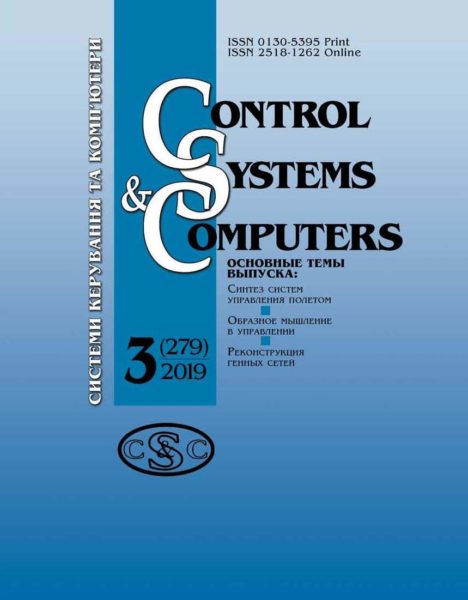Control Systems and Computers, N5, 2018, Article 5
DOI: https://doi.org/10.15407/usim.2018.05.047
Upr. sist. maš., 2018, Issue 5 (277), pp. 47-61.
UDC 303.721;004.03142
Grіtsenko Volodymyr I., Corresponding member of the Ukrainian academy of sciences, Director, E-mail: vig@irtc.org.ua,
https://orcid.org/0000-0002-6250-3987,
Manako Аlla F., Doctor of Technical Sciences, head of the department, E-mail: alla@irtc.org.ua,
Sinitsa Ekaterina M., PhD in Technical Sciences, Deputy Director on Research, E-mail: ksynytsya@irtc.org.ua,
International Research and Training Center for Information Technologies and Systems of the NAS and MES of Ukraine, Glushkov ave., 40, Kyiv, 03187, Ukraine
Digital transformations and mass-scale continuous learning
Introduction. The article deals with the actual problems of the evolution of electronic transformations under the influence of
information and communication technologies (ICT). The active use of ICT has led to significant changes in all areas of activity. Electronic transformations change the nature of objects and processes in various areas: business, government, health, library service and publishing. Under the influence of e-transformation, there have been significant changes in education: new forms and methods of learning arose, and elements of e-learning were included in the mandatory set of technologies at all levels of education.
Purpose. Analysis of the specifics of the modern period of transformations in the learning processes, namely, digital transformations, and description of their impact on massive continuous electronic education in terms of the relevant research and development tasks.
Methods. The results of the work are based on methods of system analysis, in particular, comparative analysis, generalization, research of scientific publications.
Results. Digital transformations are defined as a separate stage of change in a certain area of activity under the influence
of modern ICTs, which significantly modifies characteristics of this area and leads to the emergence of new entities. In the
field of education, a transition from the reproduction of traditional learning processes in virtual environments to the creation of new educational situations, pedagogical strategies and activities is taking place.The influence of digital transformations on changes in mass continuous education, in particular, in the interpretation of concepts of mass-scale and continuity is considered. The transformations of specific elements of mass continuous education are determined. The formulations and characteristics of tasks related to e-learning within mass continuous education are specified. The generalized set- theoretic model of mass continuous education for all as a combination of models, methods, resources, electronic and traditional environments and spaces is proposed.
Conclusion. Digital transformation affects the changing of society needs, the structure of interaction between actors, the practice of business processes. In education, the transformations lead to ualitative changes in the approaches, organization, models, methods and technologies of learning. The study of transformations in mass continuous education has made it possible to prioritize tasks and directions of technology development to ensure effective, timely and individualized learning.
Download full text! (In Russian).
Keywords: e-learning, digital transformation, information technologies for learning, education and training, mass-scale continuous education.
- Gritsenko, V.I., 2009. “Perspective of computer-based learning”. Upravlâûŝie sistemy i mašiny, 2, pp. 3-14. (In Russian).
- Bounfour, A., 2016. Digital futures, digital transformation. From lean production to acceluction. Springer International Publishing (Progress in IS).
https://doi.org/10.1007/978-3-319-23279-9 - Manako, A.F., Sinitsa, K.M., 2012. “CT in teaching: a look through the lens of transformations”. International journal “Educational Technologies and Society”, 15 (3), pp. 392–414, http://ifets.ieee.org/ russian/periodical/V_153_2012EE.html. (in Russian).
- Gritsenko, V.I. Manako, A.F., Sinitsa, E.M., 2018. “E-transformations in learning”. Upravlâûŝie sistemy i mašiny, 1, pp. 3-15. (in Russian).
https://doi.org/10.15407/usim.2018.01.003 - Manako, A.F., Sinitsa, E.M., 2010. “Mass-scale and continuity as key development factors for electronic research and education space for all”. Fifth International Conference ITEA-2010, 23-24 November 2010, Kiev: IRTC, pp. 23–33. (in Russian).
- Van Deursen, A.J., Van Dijk, J.A., 2014. “The digital divide shifts to differences in usage”. New media & society, 16(3), pp. 507-526.
https://doi.org/10.1177/1461444813487959 - Sinitsa, K, Manako, A., 1999. “Interactive Dictionary as an Information Wish-maker”. Educational Technology Magazine, Vol. XXXIX, Number 5, September-October 1999, pp. 22-25.
- Matt, C., Hess, T., Benlian, A., 2015. “Digital Transformation Strategies”, Business and Information Systems Engineering, 57 (5), pp. 339–343, http://link.springer.com/article/10.1007/s12599-015-0401-5. https://doi.org/10.1007/s12599-015-0401-5
- Center for the Digital Future. Digital Future Project Reports, [online] Available at: <https://www.digitalcenter.org/reports> [Accessed 21 Oct. 2017].
- Manako, A.F., Sinitsa, E.M., 2014. “Information society and ICT in education”. Lambert Academic Publishing. ISBN 978-3-659-59949-1, 199 p. (in Russian).
- Grosseck, G., Holotescu, C., 2011. “Teacher education in 140 characters-microblogging implications for continuous education, training, learning and personal development”. Procedia-Social and Behavioral Sciences, 11, pp. 160-164.
https://doi.org/10.1016/j.sbspro.2011.01.053 - Gasevic, D., Kovanovic, V., Joksimovic, S., Siemens, G., 2014. Where is research on massive open online courses headed? A data analysis of the MOOC Research Initiative. The International Review of Research in Open and Distributed Learning, 15(5).
https://doi.org/10.19173/irrodl.v15i5.1954 - Tracey, J. B., Swart, M. P., Murphy, J., 2018. “Perceptions of MOOC utility: How expectations affect perceived outcomes of massive online open courses”. Cornell Hospitality Report, 18 (5), pp. 3-12.
- Voychenko, A., Synytsya, K., Manako, A., 2011. “Web 2.0 based LMS extension for life long learning support”. Proc. of Elearning and software for education international scientific conference, April 28–29, 2011 Romania, Bucharest, pp. 149-154.
- Manako, A.F., Sinitsa, M., 2017. “New information technology in education for all”. Upravlâûŝie sistemy i mašiny, 2, pp. 46–58. (in Russian).
- Fidalgo-Blanco, Á., Sein-Echaluce, M.L. and García-Pe-alvo, F.J., 2015. “Methodological Approach and Technological Framework to Break the Current Limitations of MOOC Model”. J. jucs, 21, pp.712-734.
- De Lucia, A., Francese, R., Passero, I., Tortora, G., 2009. “Development and evaluation of a virtual campus on Second Life: The case of SecondDMI”. Computers & Education, 52(1), pp.220-233.
https://doi.org/10.1016/j.compedu.2008.08.001 - Love, C., 2008. “Explaining evolutionary innovations and novelties: the criteria of explanatory adequacy and epistemological prerequisites”. Philosophy of science, 75 (5), pp. 874-886.
https://doi.org/10.1086/594531 - Choshanov, M.A., 2013. Engineering of Learning: Conceptualizing e-Didactics. UNESCO Institute for Information Technologies in Education, 194 p.
- A Memorandum for life-long learning. Commission staff working paper. Brussels, SEC, n 1832, 2000, 36 p.
Received 25.11.18



